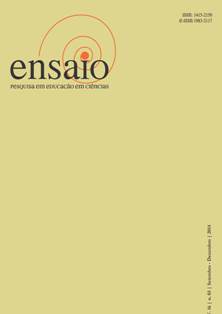O JÚRI SIMULADO COMO RECURSO DIDÁTICO PARA PROMOVER ARGUMENTAÇÕES NA FORMAÇÃO DE PROFESSORES DE FÍSICA: O PROBLEMA DO "GATO"
THE SIMULATED JURY AS A DIDACTIC RESOURCE TO PROMOTE ARGUMENTATION IN THE PHYSICS TEACHER EDUCATION: THE PROBLEM OF THE "CAT"
DOI:
https://doi.org/10.1590/1983-21172014160310%20Palavras-chave:
Argumentação; Júri simulado; Formação de professores.Resumo
Neste trabalho esclarecemos os papéis dos júris simulados e as suas contribuições para a produção discursiva e o aprendizado dos licenciandos em duas aulas que ocorreram em um curso de formação de professores de física. Os júris versaram sobre uma questão sociocientífica brasileira da atualidade: o problema das ligações elétricas irregulares (conhecidas como "gatos"). As análises evidenciaram como os júris simulados possibilitaram a produção de argumentos e contra-argumentos elaborados e diversificados. Discutimos como a alternância de papéis nos júris observados contribuiu para uma produção argumentativa de qualidade e para o processo de "descentralização" dos participantes, ou seja, a possibilidade de colocarem-se na perspectiva do "outro". Argumentamos que esse processo relaciona-se com a postura de scaffolding dos futuros professores, e o seu exercício durante a formação pode contribuir para que eles se tornem professores abertos ao diálogo e à argumentação em suas aulas.
In this paper we analyze the roles of simulated juries and their contributions for discourse production and for the participants' learning in two classes of a pre-service physics teacher methods course. These classes comprised two simulated juries about a Brazilian contemporary socio-scientific question: the problem of irregular electric connections (known as "cats") in the residencies and commerce. The analyses evinced how the simulated juries afforded the construction of diverse and elaborated arguments and counter-arguments. We discuss how the interchange of the participants' roles contributed to the production of quality arguments and to the participants' processes of "decentralization", that is, the possibility to put themselves in the other's perspective. We argue that such processes relate to the scaffold postures whose uses in teacher education can help the future teachers recognize the importance of the uses of more dialogue and argumentation approaches in science teaching.
Referências
AMERICAN ASSOCIATION FOR THE ADVANCEMENT OF SCIENCE (AAAS). Benchmarks for science literacy: Project 2061. New York: Oxford University Press, 1993. [ Links ]
BERNARDO, J. R. R. The pre-service physics teacher and the challenge of the socio-scientific issues-based approach. E-Book from THE EUROPEAN SCIENCE EDUCATION RESEARCH ASSOCIATION CONFERENCE - ESERA 2011, p. 954-960, 2012. [ Links ]
BILLIG, M. Arguing and thinking: A rhetorical approach to social psychology. Cambridge: Cambridge University Press, 1996. [ Links ]
BRASIL. Ministério da Educação. Secretaria de Educação Média e Tecnológica. Parâmetros Curriculares Nacionais: Ensino Médio. Brasília: MEC/Semtec, 1999. [ Links ]
BRASIL.Ministério da Educação.Secretaria de Educação Média e Tecnológica. (2002). PCN+ Ensino Médio: orientações educacionais complementares aos Parâmetros Curriculares Nacionais. Ciências da Natureza, Matemática e suas Tecnologias. Brasília: MEC/Semtec, 2002. [ Links ]
DUSCHL, R. A.; OSBORNE, J. Supporting and promoting argumentation discourse in science education. Studies in Science Education, v.38, p. 39-72. 2002. [ Links ]
GUMPERZ, J. J. Discourse strategies. Cambridge: Cambridge University Press, 1982. [ Links ]
JIMÉNEZ-ALEIXANDRE, M. P.; ERDURAN, S. Argumentation in science education: an overview. In: JIMÉNEZ-ALEIXANDRE, M. P.; ERDURAN, S. (Org.). Argumentation in science education: Recent developments and future directions. Dordrecht: Springer, 2008. p. 3-27. [ Links ]
KELLY, G. J. Discourse in science classrooms. In: ABELL, S.; LEDERMAN, N. (Org.). Handbook of research on Science Education. Mahwah, NJ: Lawrence Erlbaum Associates, 2007. p. 443-470. [ Links ]
KOLSTOE, S. D. Consensus projects: teaching science for citizenship. International Journal of Science Education, v. 22, p. 645-664. 2000. [ Links ]
KUHN, D. Science as argument: Implications for teaching and learning scientific thinking. Science Education, v. 77(3), p. 319-337. 1993. [ Links ]
LEONT'EV, A. N. Activity, consciousness, and personality. Englewood Cliffs, NJ: Prentice-Hall, 1978. [ Links ]
MCSHARRY, G.; JONES, S. Role-play in Science Teaching and Learning. School Science Review, v.82 (298), p. 73-82. 2000. [ Links ]
NATIONAL RESEARCH COUNCIL (NRC). National science education standards. Washington, DC: National Academy Press, 1996. [ Links ]
OSBORNE, J. Arguing to learn in science: the role of collaborative, critical discourse. Science, v. 328(5.977), p. 463-466. 2010. [ Links ]
PLANTIN, C. L'argumentation. Paris: Presses Universitaires de France, 2005. [ Links ]
SADLER, T. Informal reasoning regarding socioscientific issues: a critical review of research. Journal of Research in Science Teaching, v.41(5), p. 513-536. 2004. [ Links ]
SIMONNEAUX, L. Role-play or debate to promote students' argumentation and justification on an issue in animal transgenesis. International Journal of Science Education, v. 23, p. 903-927. 2001. [ Links ]
VIEIRA, R. D.; NASCIMENTO, S. S. Uma proposta de critérios marcadores para identificação de situações argumentativas em salas de aula de ciências. Caderno Brasileiro de Ensino de Física, Florianópolis, v. 26(1), p. 81-102. 2009. [ Links ]
VIEIRA, R. D. Discurso em salas de aula de ciências: Uma estrutura de análise baseada na teoria da atividade, sociolinguística e linguística textual. Orientadora: Silvania Sousa do Nascimento. 2011. 139 f. Tese (Doutorado em Educação) - Faculdade de Educação, Universidade Federal de Minas Gerais, 2011. [ Links ]
VIEIRA, R. D., et al. An activity theory-based analytic framework for the study of discourse in science classrooms. Ensaio Pesquisa em Educação em Ciências (Online), v.14(2), p.13-46. 2012. [ Links ]
VIEIRA, R. D.; KELLY, G. J. Multi-level discourse analysis in a physics teaching methods course from the psychological perspective of activity theory. International Journal of Science Education, v.36(16), p. 2.694-2.718. 2014. [ Links ]
ZEMBAL-SAUL, C. Learning to teach elementary school science as argument. Science Education, v.93, p. 687-719. 2009. [ Links ]
ZEMBAL-SAUL, C., et al. Scaffolding pre-service science teachers' evidence-based arguments during an investigation of natural selection. Research in Science Education, v. 32(4), p. 437-463. 2002. [ Links ]


